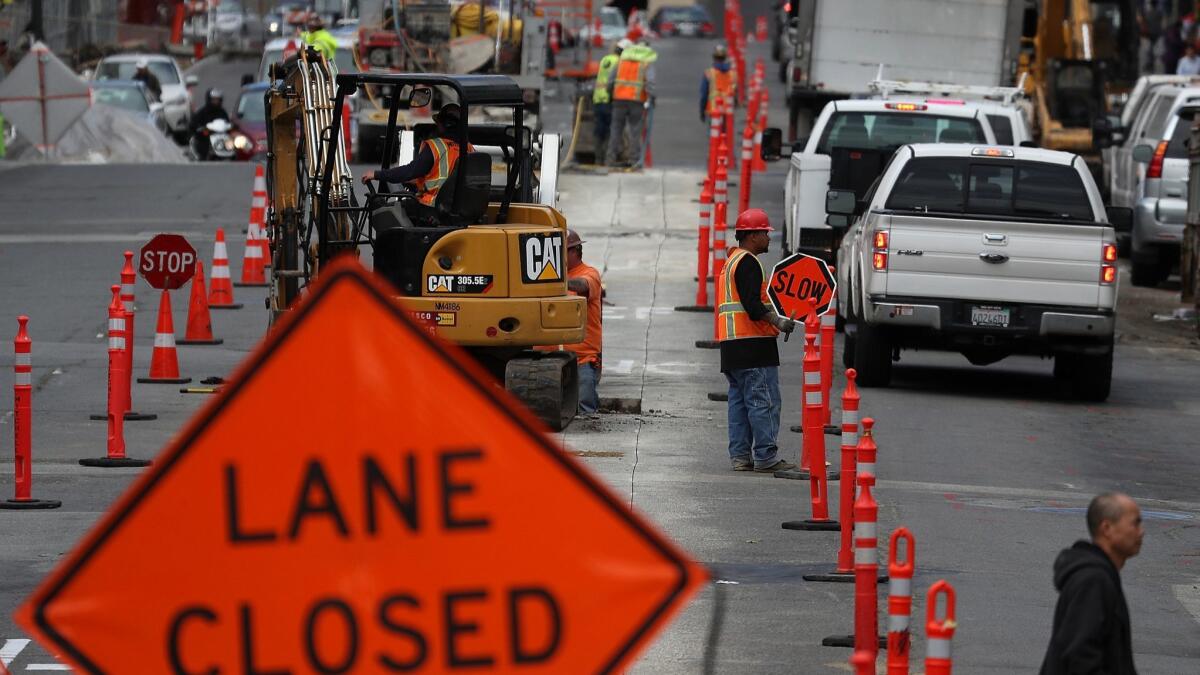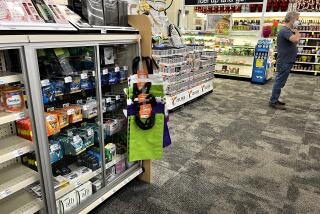California ballot will include gas tax repeal in November

- Share via
Reporting from Sacramento — Californians will vote in November on a ballot proposition that would repeal a new gas tax and vehicle fees, saddling Gov. Jerry Brown with a final challenge to preserve a key part of his legacy before leaving office.
With polls showing most California voters want to kill the new tax, the initiative poses a real threat that the funding plan pushed by Brown and Democratic legislative leaders to fix the state’s roads and bridges won’t survive the Nov. 6 election. The measure earned a spot on the statewide ballot Monday, garnering more than the 585,407 signatures of registered voters required, according to a random sample count announced by state officials.
Brown on Monday blasted the initiative and gave a preview of his campaign strategy.
“This flawed and dangerous measure pushed by Trump’s Washington allies jeopardizes the safety of millions of Californians by stopping local communities from fixing their crumbling roads and bridges. Just say no,” Brown said in a statement.
Brown is up against a campaign financed by national Republican leaders including House Speaker Paul D. Ryan, House Majority Leader Kevin McCarthy of Bakersfield, the California Republican Party and GOP gubernatorial candidate John Cox. Together they spent $1.7 million to put the initiative on the ballot, and are expected to spend millions more to make sure voters repeal the tax and fees, a campaign they hope will turn out a conservative tide for congressional races.
Cox welcomed the news.
“This is a message to the millions of forgotten Californians ignored by the Sacramento political elite, help is on the way,” Cox said in a written statement. “Let this also be a message to every special interest in Sacramento, we’re coming for you. You can outspend the people, but you can’t outvote the people, because there are more of us than there are of you.”
Lt. Gov. Gavin Newsom, a Democrat who is favored over Cox in the race for governor, opposes repeal of the gas tax, saying the money is needed to handle a backlog of road and bridge repairs.
Senate Bill 1, which Brown signed last year, will raise more than $5 billion annually from a higher fuel tax and a new vehicle registration fee for road repairs and improvement to mass transit systems across the state. Brown, who leaves office in January, recently conceded that “nobody likes the tax, but it’s doing stuff,” saying it is necessary to keep the state’s road system from falling apart.
“What he is fighting for is his legacy, and so I think he would have every reason in the world to put a lot of emphasis on keeping the gas tax in place,” said Darry Sragow, a longtime Democratic strategist and publisher of California Target Book, which tracks political contests in the state.
The governor, who last reported $14.8 million in his campaign account available to fight repeal, has already begun offering his defense of the higher tax at press conferences throughout the state where he has announced the start of projects that they have made possible.
In late May, he visited Torrance to highlight construction of a transit terminal. Brown called the repeal effort “crazy” and said the rejection of the tax would mean trouble for California.
“If you say no, what? We are just going to go back to congestion, call a halt to this project, stop the projects for the Olympics?” Brown said. “That is really dumb and I don’t believe Californians are going to do that. That’s why we want to vote ‘no’ on any attempt to repeal and throw back this tax.”
The ballot measure that qualified would not only repeal last year’s new levies, it also would amend the California Constitution to require voter approval for future gas tax increases.
Coverage of California politics »
Brown argues that a large backlog of road and bridge repairs require additional money. SB 1 raised the state gas tax by 12 cents per gallon and boosted the diesel fuel tax by 20 cents per gallon. The measure also created a new, annual vehicle fee ranging from $25 for cars valued at less than $5,000, to $175 for cars worth $60,000 or more.
Los Angeles Mayor Eric Garcetti appeared with Brown in Torrance, and he and leaders of other cities are expected to play prominently in the anti-repeal campaign, telling voters that potholed roads and crumbling bridges in their communities need the influx of dollars provided by the new tax and fees. A portion of the billions raised by the fees will go toward expansion of the Los Angeles County Metropolitan Transportation Authority’s bus and rail systems.
“If you want to pay for more popped tires, realigned axels, you want to see our roads continue to deteriorate, go ahead and repeal SB 1,” Garcetti said. “But we all know like with our houses, if we don’t fix the leak we are going to be paying a lot more in the future.”
Opponents of the gas tax complained this week that the state and local governments have been abusing taxpayer funds by putting up signs along roads throughout the state touting the construction made possible by SB1, but state officials say such signs have been a common sight for decades.
City transit officials plan to demonstrate to voters that the money is being well spent on real road projects.
“I think in part our responsibility to the taxpayers is to shine a bright spotlight on the improvements that these dollars are making in communities every day already,” said Carolyn Coleman, executive director of the League of California Cities.
Repeal, she said, “would mean the loss of important and scarce resources to make the long overdue improvements in our streets and roads and bridges and easing traffic congestion.”
But the pro-repeal forces are likely to begin the campaign with favorable odds. Scrapping the higher tax and fees was supported by 51% of registered voters in the state, according to a USC Dornsife/Los Angeles Times statewide poll last month.
With billions of dollars at stake, both sides are planning big-budget campaigns. The gas tax is supported by the Coalition to Protect Local Transportation Improvements, which reported $5.1 million in campaign donations as of May 19.
Some of that went to support Proposition 69, which was approved by voters on the June 5 ballot, and requires gas-tax money to go to transportation projects.
Much of the money raised so far by the main campaign for the initiative has gone to signature gathering, with big contributions from the California Republican Party and GOP leaders.
Republicans see the gas tax as a defining issue for congressional and state legislative candidates in the November election, with hopes it will also draw more conservative voters to the polls.
“The Republicans want this as a way to get out the vote,” said Tony Quinn, a former Republican political consultant.
Sragow said Republicans will work to make the debate over repeal a fight with Brown, but he said backers of the tax need to build on a broad coalition of labor and business to show the benefits of the money to the lives of working Californians.
It is notable that Republicans and big business are on opposite sides of the measure even though they traditionally are allies on tax issues, Sragow said. That, coupled with the money business can raise, could help save the gas tax, he said.
A second group supporting repeal, Reform California, reported $1 million in its treasury as it launches a campaign. The group said it has momentum after voters recalled state Sen. Josh Newman from office on June 5 over his vote to raise the gas tax, said Carl DeMaio, chairman of Reform California.
“We are wasting no time in launching our efforts for the repeal phase of the campaign to ensure we are victorious in November,” said DeMaio, a conservative radio talk show host and former San Diego City Council member.
The group opposing repeal, Fix Our Roads, has a multi-faceted message, arguing that doing away with the increased gas tax and fees would jeopardize public safety by preventing the state from fixing roads in “poor” condition, and more than 1,600 bridges and overpasses that are structurally deficient and unsafe.
The campaign will warn that repeal would stop or threaten more than 5,000 transportation improvement projects already underway. Opponents of repeal also say it would make traffic congestion worse and cost motorists more in the long run by requiring car repairs from damage suffered on bad roads.
Sragow, who has known Brown for years, said he thinks the governor will come out swinging.
“He doesn’t shy away from a fight,” Sragow said. “Nobody can scare Jerry Brown. The fact that a bunch of Republicans from other parts of this country are looking at this place as a battleground for things that have nothing to do with California will incense Jerry Brown.”
Twitter: @mcgreevy99
UPDATES:
8:45 p.m.: This article was updated with information about Lt. Gov. Gavin Newsom’s stance on the issue.
This article was originally published at 2:20 p.m.
More to Read
Get the L.A. Times Politics newsletter
Deeply reported insights into legislation, politics and policy from Sacramento, Washington and beyond. In your inbox three times per week.
You may occasionally receive promotional content from the Los Angeles Times.











